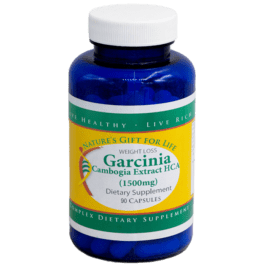Weigh Management
DOCTORS RECOMMENDED PRODUCTS
-
All Products, Special Products, Weight Management
Garcinia Cambogia Extract 1500mg
0 out of 5(0)- Garcinia Cambogia contains strong weight loss properties which inhibiting processes that convert carbohydrate and sugar into fat.
- Helps to increase levels of serotonin, which in turn helps to suppress appetite.
- Increases metabolism enabling the body to burn fat at a faster rate.
- Fights against diseases associated with poor diet and obesity such as diabetes, heart disease.
- Reduces stress by increasing levels of serotonin,
- Control blood sugar levels by improving cell uptake of glucose,
- Help to improve stamina and eliminates fatigue,
- Garcinia Cambogia helps reduce LDL (bad cholesterol), and triglyceride levels while increasing HDL(good cholesterol) in check.
- Curbs food binges caused by emotional eating,
- HCA has also show excellent results in regulating cortisol levels
- Manages levels of leptin.
>>>Read More
SKU: n/a -
Weight Management
Colon Cleanser 60 (cap) (Weight Management)
0 out of 5(0)Benefits of this product for Weigh Management
- The benefits are two-fold: immediate weight loss and a more efficient digestive system
- Helps regulate blood sugar levels and digestion, lowers fat absorption, helps relieve constipation
>>>Read More
SKU: n/a12,895CFA -
Weight Management
Slim & Beautiful (Weight Management)
0 out of 5(0)Benefits of this product for Weight Management
- Helps burn fat and promote healthy digestion
- Detoxifies, firms, and moisturizes the skin
- Reduces blood sugar, blood pressure, and serum cholesterol, and helps relieve constipation
>>>Read More
SKU: n/a29,650CFA
Weigh Management: Being overweight or obese is when the body has excess body fat. One measurement used to determine a healthy weight is Body Mass Index (BMI), which is calculated by dividing a person’s weight in kilograms by the square of their height in meters. Most weigh management practitioners use the following BMI ranges as a guide to determine if a person is overweight or obese: BMI 25 to 29.9 (overweight) BMI 30 to 39.9 (moderately obese) BMI 40 or above (extremely or morbidly obese).
Without weigh management , the risk of developing serious health problems such as heart disease, high blood pressure, type 2 diabetes, gallstones, breathing problems, and certain cancers increases with your body mass index. The risk of developing these diseases is even higher when weight is concentrated near the waist. Women with a waist circumference of more than 88.9 cm and men with a waist circumference of more than 102 cm are at increased risk hence the need for weigh management. A high waist to hip ratio (indicating that fat is centered around the waist) increases the risk for developing serious, even
life-threatening conditions associated with obesity. Generally, for men a ratio of 90 or less is considered safe. For women, .80 or less is considered safe. Weight gain or obesity occurs when a person takes in more calories than he uses. When the body fails to burn off excess calories, it is turned into fat. Contributing lifestyle factors that may lead to obesity include consuming excessive starch, fatty foods and sugars and lack of exercise (inactivity). Having a diet that’s high in calories, eating junk fast food, skipping breakfast, eating most of your calories at night, consuming high-calorie drinks and eating oversized portions all contribute to weight gain at the end requiring weigh management.
Obesity can also be the result of genetics (low metabolic rate), aging, immobility, psychological tension or stress, pregnancy, medications (corticosteroids, blood pressure medication, tricyclic antidepressants, seizure medications, diabetes medications, antipsychotic medications) and hormonal dysfunction (Cushing’s syndrome, hypothyroidism). Diabetes, allergies, hypoglycemia, anxiety and depression can lead to weight gain.
Getting less than seven hours of sleep a night can cause changes in hormones that increase your appetite. You may also crave foods high in calories and carbohydrates, which can contribute to weight gain. Obesity can lead to social, emotional and physical problems w.
It can set the stage for serious conditions, such as: high blood pressure, heart disease, kidney disease, Type 2 diabetes, gallbladder disease, osteoarthritis, respiratory disorders, stroke, blood lipid (fat) abnormalities, cancer (including cancer of the uterus, cervix, ovaries, breast, colon, rectum and prostate), depression (including feelings of self-hatred and negative body image), gynecological problems(such as infertility and irregular periods), metabolic syndrome, nonalcoholic fatty liver disease, skin problems (such as intertrigo— rashes or infection in folds of your skin—and impaired wound healing).
Weight gain may also lead to annoyances such as snoring, sleep apnea, difficulty sleeping, back and joint pain, excessive sweating, always feeling hot, feeling out of breath with minor exertion, daytime sleepiness or fatigue and recurring heartburn. weigh management plan with increased physical activity, combined with a diet limited in calories, provides the most effective weight loss and maintenance strategy. Several natural supplements help to promote healthy metabolism and increase general nutrition during this lifestyle change.
Healthy Things You Can Do for Weigh Management…
WEIGHT GAIN = Consuming more calories than you burn
WEIGHT LOSS = Burning more calories than you consume
Healthy Balanced Nutrition = Eat Healthy and Reduce Calories!
• Eat a healthy, well-balanced, calorie-appropriate diet. Avoid junk food. Cut down on sugar and fatty foods. Reduce carbohydrate (especially those with a high glycemic index).
• Eat well. Increase your fiber intake. Eat at least five servings of fresh fruits and vegetables every day (with meals or as snacks). They are full of vitamins, minerals and other phytonutrients as well as fiber.
• Eat three servings of low-fat or fat-free dairy food every day.
• Include lean protein, a variety of beans, whole grains, raw nuts and seeds in your daily diet.
• Have a big breakfast and reduce the intake of energy rich foods later in the day. This can help your metabolism and ensures that most of the energy that you consume is burnt throughout the day.
• Avoid binge or emotional eating, and eat smaller portion sizes. You can try using a smaller plate size at each meal.
• Increase low calorie fruits (apples, blueberries, cantaloupe, cranberries, grapefruit, honeydew, lemons, mangos, oranges, papaya, peaches, pineapple, raspberries, strawberries, tomatoes, tangerines, watermelon) and low calorie vegetables (asparagus, beets, broccoli, cabbage, cucumber, carrots, cauliflower, celery, chicory, chili peppers, cucumber, green beans, lettuce, garlic, onions, radishes, spinach, turnips, zucchini).
• Increase fat burning foods including: oatmeal, almonds (not more than 20 per day), occasional eggs (contain vitamin B12, which metabolizes fat; but also a source of saturated fat), beans and legumes, lean meat, fish, skim milk, low fat yoghurt, avocados, cannellini (white) beans, green tea (iced or hot), Parmigiano-Reggiano cheese and red grapefruit.
• Add whey protein (as meal replacement or as a supplement) to your diet. It contains amino acids that burn fat and build muscle.
• Choose the right fats (monounsaturated fats like olive or canola oil). Everyone needs a little fat—it controls hunger. “Good fats” will help keep your cholesterol under control and satisfy cravings. Consume in moderation. • If you get hungry between meals, eat fruits, vegetables, healthy nuts or tea. • Drink a lot of water (at least six to eight glasses of water per day) for maximum benefit especially when taking a weight loss supplement. Drink less and less soda, alcohol, sugary drinks and sports drinks. Water helps fiber in moving out the toxins, and it helps reduce feelings of hunger.
• Use Slim Sweet or NG4L Stevia Sweet as your zero calorie natural sweetener.
• Make sure your last meal of the day is 3 hours before bedtime.
Increase Physical Activity
Burn Calories Exercise regularly, preferably with professional guidance at the beginning of your lifestyle change to establish a beneficial routine. Increased physical activity reduces your stress, blood pressure, cholesterol, and risk of heart disease, stroke, and diabetes. It will stimulate your metabolism, boosting your energy and helping you lose weight!
• Make a realistic exercise plan that fits for you. Pick a plan you would easily stick to (exercising at home, jogging, walking briskly, swimming, cycling, dancing, or joining an aerobic group).
• Aim to accumulate 30 minutes of physical activity over the course of each day. • Find an exercise buddy to help you stick to your plan.
• Find day-to-day ways to increase activity: Park further away and walk, or take the stairs instead of an elevator. Other Suggestions
• Design your own personal Weight Management Program with realistic goals. Goals that are too extreme early on can become discouraging.
• Reduce stress, and learn effective ways to deal with stress. Practice yoga.
• Get support from friends and family, as well as from professional weight-loss organizations or a local support group. Surround yourself with people who will support you and help you, not sabotage your efforts. Make sure they understand how important weight loss is to your health.
• Do not smoke.
• Monitor weight and body fat percentage regularly using the NG4L Body Fat Scale.
• Educate yourself about obesity – this can help you learn more about why you became obese and what you can do about it. You will feel more empowered to take control and stick to your treatment plan.
• Get enough sleep; at least seven hours per night.
• Do a thorough cleansing program to clear out accumulated waste and toxins in the bowel, liver, and blood.





